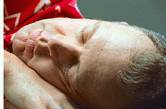
FRIDAY, May 10 (HealthDay News) — If you have trouble sleeping at night, you may be headed for more than just frustration and fatigue: Middle-aged and older adults with insomnia are more likely to be hospitalized and use home health care services, a new study suggests.
Preventing insomnia in this group of people could reduce their use of health services by anywhere from 6 percent to 14 percent, according to the researchers from Johns Hopkins Bloomberg School of Public Health.
The researchers looked at U.S. national data on insomnia symptoms and health-services use among nearly 14,400 middle-aged and older adults. They found that more than 40 percent of the study participants reported at least one insomnia symptom, such as trouble falling asleep, waking up during the night, and waking up too early and not being able to fall asleep again.
The researchers said they found a significant association between insomnia symptoms and the use of costly health services such as hospitalization and home health care services within two years.
“These results suggest that treating and carefully monitoring insomnia symptoms in middle-aged and older adults might somewhat reduce the use of health services and presumably the poor health outcomes that necessitate these services,” study lead author Christopher Kaufmann, a doctoral student with the Bloomberg School’s department of mental health, said in a school news release.
The study was published online May 10 in the Journal of Gerontology: Medical Sciences. While the study tied insomnia to greater use of some health care services, it didn’t prove cause-and-effect.
Insomnia is the most common sleep problem at any age and affects nearly half of adults 60 and older, according to the U.S. National Institutes of Health. People with insomnia often get too little sleep, have poor sleep quality and don’t feel refreshed when they get up in the morning.
More information
The American Academy of Family Physicians has more about insomnia.

